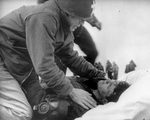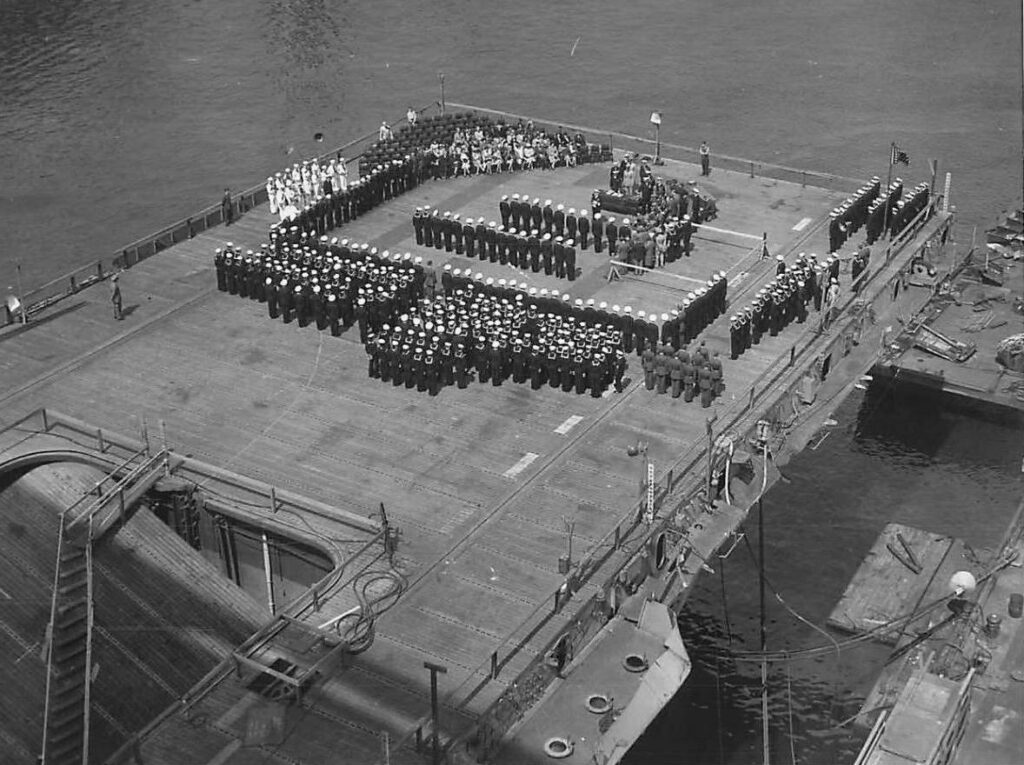“Heroism,” A Common Theme In News Reports of USS Franklin Attack

On Friday, May 18, 1945, almost two months after “Bomb Day,” newspapers published the news about the attack on Big Ben and the heroism of the crew in saving the ship. First broadcast on radio the evening before,1 it was front page news in papers from New York to Brownsville, TX to Honolulu.
Banner headlines blared:
“USS Carrier Blasted, 772 Lost2“
“Unsinkable ‘Big Ben’ Lives To fight The Japanese Again3“
“Carrier Wrecked by Bombs, Gets Home Despite Big Loss4“
Despite happening nearly two months earlier, Franklin’s news dominated the headlines that day competing against stories of savage fighting on Okinawa and Mindanao. Other articles reported Japanese attempts to use the Soviet Union to help broker a negotiated peace. In Europe, although the war had ended earlier in the month, a story about an assassination plot against General Eisenhower made many papers. Another mentioned that the hunt for high-level members of the German government continued.
The US Navy had broken the story about Franklin’s attack by calling the media to a meeting at Navy Public Relations headquarters in New York on 17 May. Captain Gehres and 29 other officers and enlisted men told their stories. Additionally, Kansas City Star and Associated Press reporter Alvin McCoy, who had been aboard Franklin when she was bombed, saw his story finally published. Many newspapers, large and small, ran his story which was rich in first person accounts recorded on 19 March.
“…the bravest man I ever saw.”
Reporters also learned that Captain Gehres had recommended more than 500 of the crew for recognition including Father O’Callahan and Lt. Donald Gary for the Medal of Honor. Gehres was lavish in his praise of both men being quoted in multiple news accounts as calling Father Joe, “…the bravest man I ever saw.”
Commander Henry Hale, the ship’s third in command, was interviewed and shared that four jeeps on the flight deck had come through the attack unscathed and made the job of towing damaged aircraft and other heavy debris much easier. They were also used to generate electricity. He then added that the day after the attack
the first food survivors ate came from a locker that had escaped serious bomb and fire damage. “We broke that locker open. It was filled with -what do you think-Spam. We had Spam for two days until we busted into a steak locker. We were sick of steak by the time we hit Pearl Harbor.5
Not present that day was Father Joseph O’Callahan, who, according to reports, had begged off due to a cold, but more likely because he didn’t want to be the center of attention. When reporters from The Boston Daily Globe pressed the Navy Public Relations staff for interviews, Father Joe proposed a deal where he would be interviewed if the Navy expedited the letters he had written to victims’ families. They did and the interview was given.6 In an article that stretched across the top of the front page, the paper’s reporters wrote:
Insisting on crediting virtually everyone else on board but himself with acts of bravery, Fr. O’Callahan, who formerly taught mathematics at Holy Cross, used the pronoun “we” throughout an interview with the Globe at the Commodore Hotel.7
Other newspapers also printed “the local angle,” mentioning the names of those in their communities that were missing or dead. Or, when possible, interviewing those who survived. Seaman 2nd class, John Surrette of “East Boston,” was interviewed by The Boston Daily Globe and told the reporter that he had arrived home 10 days earlier, suffering from burns received during the attack but had been unable to tell his family how he was wounded until he learned the news was released.
Yeoman 3c Quido Cavallo of Galloway W. VA was mentioned in the Hinton, West Virginia newspaper called The Leader. He described jumping overboard with a friend, but “…the friend never made it.”8
The Knoxville News-Sentinel found another local angle. Saxie Dowell, a well-known bandleader had made the song Three Little Fishes, written by two University of Tennessee co-eds, famous. Although Saxie is credited by most with writing the song, he came to Knoxville on tour before the war, heard the song and made a few changes in it after paying the two co-eds for the rights.9 In the next column the paper also reported that a local man, Lt. Roy, “Stumpy” Julian, radio chief on Franklin was missing.10
In Inferno The Epic Life and Death Struggle of The USS Franklin In World War II, author Joseph Springer writes that many of the men had no idea of the number of shipmates they lost until the news was released.
There was no mention in any news accounts of the charges Captain Gehres wanted to bring against seven officers nor was anything written about the treatment of those the Captain considered outcasts.
Awards Ceremony Held

On May 22, newspapers published articles reporting on the awards presented to many of the crew the day before. Awards ranged from Navy Crosses to letters of commendation. Later, In January 1946, President Truman presented Medals of Honor to Father Joe and Lt. Donald Gary.
One last note about the news articles. In New York, the Rochester Democrat and Chronicle reported that, after the attack, Saxie Dowell’s band borrowed or made instruments from anything they could find. The article read:
When the Franklin nosed into Pearl Harbor, Saxie Dowell’s boys were on the wreckage of the flight deck, tub, bucket, slide whistle and all. To the tune of “The Old Gray Mare” they were playing: “The old Big Ben, she aint’ what she used to be.
- Inferno The Epic Life and Death Struggle of the USS Franklin in World War II (Minneapolis: Zenith Press, 2011) 308
- “USS Carrier Blasted, 772 Lost.” New York Daily News (New York), May 18, 1945
- Unsinkable ‘Big Ben’ Lives To fight The Japanese Again Honolulu Star-Bulletin May 18,1945
- Carrier Wrecked by Bombs, Gets Home Despite Big Loss New York Times May 18, 1945
- J_p Pilot Realized Aviator’s Dream In Big Ben Bombing Dunkirk Evening Observer (Dunkirk, NY) May 18,1945
- Chaplain Trades Talk For Aid In Speeding Letters to Parents Boston Daily Globe May 18, 1945
- Boston Hero Chaplain Tells Own Story of U.S. S. Franklin Disaster Boston Daily Globe May 18, 1945
- Big Ben Disaster Produced Many Heroes The Leader (Hinton, WV) May 24, 1945
- Saxie Dowell Hero in Franklin Attack The Knoxville News-Sentinel May 18, 1945
- Knox man on ‘Big Ben,’ His Fate Is Unknown The Knoxville News-Sentinel, May 18,1945
If you’ve read this far, feel free to sign up for my monthly newsletter. You can do that by scrolling to the bottom of my homepage. Nope! I won’t spam you.